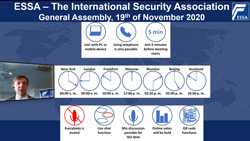
Caption:
The 2020 General Assembly of ESSA was conducted as a web meeting.
Photo:
ESSA - Photo No. 261
ESSA members from all over the world hold their general assembly virtually
- Members discuss direct and indirect effects of the COVID 19 pandemic on the industry
- European Security Systems Association (ESSA) e.V. has 115 members from 37 countries worldwide
Frankfurt, November 25, 2020 – Normally, no distance is too far for members of the European Security Systems Association (ESSA) to attend their annual general assembly in Frankfurt. They come together from New Zealand, Brazil, China, India, Russia, Ukraine, the USA and almost all EU countries to strengthen their network and exchange on the progress of their global standardization efforts. Last week, the ESSA family came together again - and yet everyone stayed at home. Due to the COVID-19 Pandemic, the 2020 General Assembly was conducted as a web meeting.
The virtual format has not detracted from the international character of the project. "Over 60 members from four continents took part," reports Dr. Markus Heering, the ESSA Managing Director. That is a considerable proportion of the 115 ESSA members from 37 countries. Despite the good response, he hopes that a real meeting can take place again next fall in Frankfurt. Although the online format is effective for formalities and specialist presentations, there is a lack of opportunities for face-to-face meetings and networking.
Direct and indirect impact of COVID-19 on the physical security industry
The need for a virtual general assembly is one of many effects of the pandemic on the industry. Over the past few months, telephone calls and web meetings have moved instead of visits to member companies and laboratories. Trade fairs have been cancelled and more and more communication has shifted to social media, ESSA Deputy Managing Director Falko Adomat reports. The impact of COVID-19 on the sales of manufacturers of ATM safes and safes for private and commercial use is also unmistakable. A survey conducted by ESSA among its members in October 2020, for example, revealed that sales in both the private customer and B2B sectors were down on 2019. In the commercial sector in particular, pandemic-related delays in investment projects led to a drop in sales for more than half of the members surveyed, in some cases steep declines. In the B2C segment, the business situation also clouded over. However, the situation here was more positive. The outlook for 2021 shows that manufacturers see the sales slump primarily as result of the pandemic: Respondents expect the market for safes for both private and commercial customers to recover, with growth rates of between five and ten percent.
Cashless payments increase significantly during the pandemic
In a lecture Jürgen Göbel, member of the board of the „Initiative Deutsche Zahlungssysteme“ (German Payment Systems Initiative), reported that the Corona crisis has had a significant impact on the payment behaviour of Germans, who have so far had an affinity for cash. The number of transactions by Girocard rose by a staggering 20.7 percent in the first half of 2020. The fact that sales only rose by 10.9 percent in the same period indicates that customers are increasingly paying smaller amounts by card. In addition, more and more users are taking advantage of the possibilities of contactless payment, which they consider convenient, hygienic and modern, according to surveys. In addition, studies show a clear upward trend in the acceptance of payment by card or smartphone, with a simultaneous decline in cash use. The latter fell from 63 to 47 percent between 2018 and 2020. In contrast, cashless payments increased from 36 to 52 percent. "During the pandemic, we are registering a strong increase in the acceptance of card payments across all age groups," reported Göbel. He added that he does not expect this trend to reverse after COVID-19, especially as age groups that have had a strong affinity for cash are now turning to cashless payment too.
Impact on the ATM market
According to Rowan Berridge, expert of the London based market research and consulting company RBR, the trend described by Göbel is affecting the Automated Teller Machine (ATM) market. For manufacturers of ATMs and for their suppliers from the physical security industry, the first lockdown in the UK resulted in a 59 percent decrease in ATM transactions compared to the previous year. Besides the UK, several important markets showed a steep decline in transactions in 2020. Berridge and his team regards this is a special effect caused by the pandemic. He expects the market to be almost stable until 2025. The installed base of ATMs, for example, will only fall by one per cent in the next five years and RBR also expects the situation to calm down in terms of transactions. The number of transactions is declining in Europe and the Americas. However, growth in the Asia-Pacific region, the Middle East and Africa would almost offset the trend. By 2025, the number of worldwide ATM transactions will decrease by two percent, he predicted at the ESSA general meeting.
The ESSA members are taking these messages as an impulse for continuing their efforts to ensure highest security standards for private and commercial safes. Various working groups are currently pushing ahead with the drafting of EN standards for burglar-resistant safes. One focus is on the security of distributed, digitally networked systems. Another issue is the ongoing adaptation of standards to the increasingly powerful tools used by burglars to gain access to secure storage units.
Against this background, ESSA emphasises the need for sound regulatory frameworks tailored to the specific conditions in different markets and regions. Its organisational basis must allow the security level of safes and other secure storage units to be regularly reviewed by expert committees and adjusted if necessary. "Especially in our security-relevant industry, standardisation must not result in a global minimum consensus. We need agile regulation that can react quickly and precisely to regional peculiarities," Heering warns. Only by doing so, it would be possible to stay one step ahead of increasingly professional criminals. This is precisely the purpose of the European Security Systems Association.
Text: 5.941 Z. inkl. LZ.



